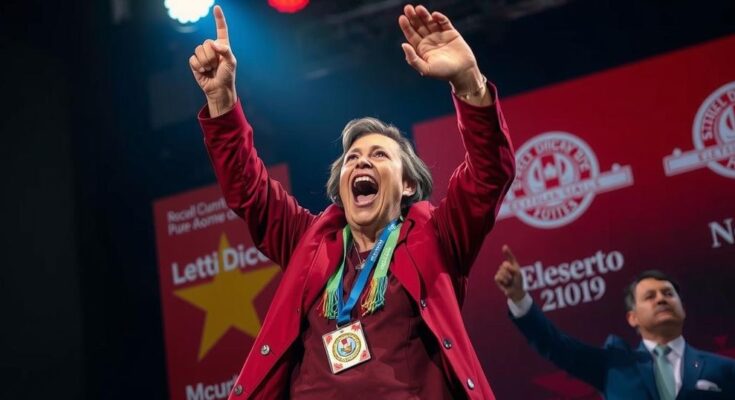Yamandu Orsi of the Broad Front coalition won Uruguay’s presidential election, defeating Alvaro Delgado from the National Party with 49.8% of the vote. Current President Luis Lacalle Pou has promised a smooth transition. Orsi’s victory reflects essential voter concerns such as economic and crime issues.
Yamandu Orsi, the left-wing candidate from the Broad Front coalition, emerged victorious in Uruguay’s presidential election, as confirmed by the electoral results released on Sunday after a second-round run-off vote. Orsi garnered 49.8% of the votes, defeating Alvaro Delgado of the ruling center-right National Party, who received 45.9%. With voter turnout at nearly 90% in a nation of approximately 3.5 million people, the outcome was significant, as it represented a shift back to the left after the National Party’s recent governance. Orsi’s win reflects the electorate’s concerns regarding stagnant economic growth and an increase in violent crime, which dominated discussions leading up to the election. In his victory speech, Orsi proclaimed, “The country of liberty, equality and fraternity has triumphed once again.” He emphasized the need for unity and included all sectors of society in his call to build a better nation. In response to the loss, Delgado graciously acknowledged Orsi’s victory, stating, “With sadness, but without guilt, we can congratulate the winner.” In a display of political civility, current President Luis Lacalle Pou pledged a smooth transition of power, stating he would assist Orsi as needed. As the new president, Orsi, a former history teacher and mayor of Montevideo, is anticipated to draw on the legacy of former President Jose Mujica to further advance progressive policies in Uruguay.
The recent presidential election in Uruguay marks a significant political shift as it brings the left-wing Broad Front coalition back into power after a period of rule by the center-right National Party. The election results are particularly notable given the challenging socio-economic landscape characterized by sluggish economic growth and rising crime rates. The Broad Front, historically associated with larger progressive agendas, had previously held a majority for 15 years until the National Party’s victory in 2019. Yamandu Orsi is expected to address these pressing issues while building on previous reforms championed by his predecessors such as Jose Mujica, who has been acclaimed for his progressive leadership and unique lifestyle.
Yamandu Orsi’s election as president of Uruguay signifies a return to leftist governance, focusing on crucial socio-economic reforms in response to voter concerns. His commitment to fostering inclusivity among differing political sentiments within the nation, along with a promise of a seamless transition from the outgoing administration, reinforces expectations for a cooperative political climate. Orsi’s leadership is poised to navigate the challenges of economic stagnation and rising crime as he embarks on his presidency.
Original Source: www.dw.com




